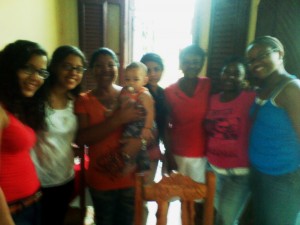On the dance floor, when the sway of my hips and the movement of my feet were more fluid than expected for a tourist, salsa songs were often followed by a Cuban asking “oye, de donde tu ere?”
“De Nueva Yol, pero soy Dominicana y Puertorriqueña.”
It was a distinction that, at first, came instinctually and eventually transformed into a conscious decision. I came to cherish the nearly instant connection that happened when I spoke in Spanish, properly rolling my double r’s, switching many of my “r’s” to “l’s,” chopping off “d’s” and “s’s.”
Conversations were smoother, franker. A 17 year old young man we met commented that we (I was with Ishaira, a Puerto Rican classmate) spoke like he did, referring to our Caribbean-accented Spanish. It was a comment that set the tone for a conversation during which our worlds mingled and collided, revealing aspects of our lives and homes. In Mabel’s paladar in Cienfuegos, I had an even warmer experience. Not only was it the best food I had in Cuba, but Mabel’s home and restaurant had a welcoming atmosphere. She talked with us, told us to feel at home, and danced a Bachata song with me, making me the happiest and most comfortable I had been my entire time in Cuba.
My dark curly hair and café con leche complexion set me apart from the tourist world I felt uncomfortable in, providing me with a veil of ordinariness when I was surrounded by other people from our group who were often read as Cuban that left the menu-wielding restaurant and paladar staff on Obispo uninterested. It was a little refreshing, actually.
The way I looked, however, was also a burden sometimes. The longer we were in Cuba the more painfully aware we were of the misunderstandings that could result from it. One night, on our way back from La Floridita, the salsa club and bar we grew fond of in La Habana, our group had dwindled to the Black Hispanic members of our class. Two of the Black young women in our group often read as Afro-Cuban were drunk. Almost at the hotel, one of the Hispanic young men in our group yelled: “F*ck! All the white people left!” At the time, we couldn’t handle our laughter. Upon entering the Hotel Plaza, however, the tension in our group rose. We realized how the scenario could be interpreted: the men in our group were tourists taking Cuban jineteras up to their room. The hotel staff knew our faces by now, though, and they allowed us to walk up to our rooms uninterrupted.
I felt strangely at home in Cuba. It began to fulfill the need for a return to my ancestral lands. It brought me a little closer to a life my mother and sister knew in the Dominican Republic but which I only share by virtue of blood and heritage.
One Response to “Navigating Cuba as a Caribbean Woman: Dominican and Puerto Rican”
Leave a Reply
You must be logged in to post a comment.

This is beautiful Jennifer! Thanks for sharing:)